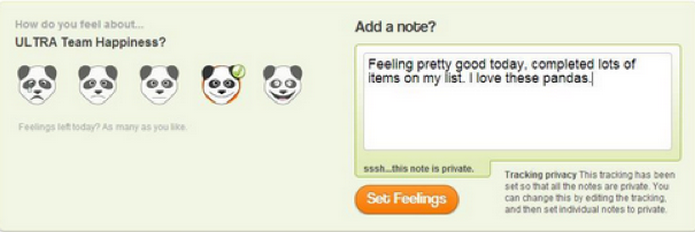As social entrepreneurs, we’re obsessed with measuring impact. Sometimes we’re able to measure what matters—often we can get stuck measuring only what we can easily count, even if we’re limited to outputs that may or may not drive the outcomes we desire.
There is one thing that matters a lot, no matter what your mission, and measuring it only requires that you pause to look inward.
Happy humans are productive humans Tweet This Quote
There’s plenty of evidence supporting the simple notion that happy humans are productive humans, and you don’t have to look far to find convincing arguments vis-a-vis the economic advantage for countries with happy citizens and the performance advantage for organizations with happy employees.
Happiness matters, but the reality for most of us is that we don’t have the time or money to spend measuring things that might seem “soft” v.s. the jobs we’re creating, the lives we’re improving, the communities we’re protecting or the eco-systems we’re saving.
First, happiness is not soft! Happiness can drive team performance as much as skills or compensation. Second, measuring happiness can be done with ease, at no cost! An ever-expanding list of free, plug-n-play management tools will do this for you, including many that track team happiness and wellbeing on a regular basis.
Happiness can drive team performance as much as skills or compensation Tweet This Quote
At ULTRA Testing, a NYC-based technology company that provides high quality, highly responsive software testing services, team happiness is measured daily. When my co-founder and I started ULTRA in 2012, we set out to prove the competitive advantage of a truly diverse workforce—today, we’ve not only proven that advantage, we’ve also been able to measure it.
On an average day, ULTRA testing teams can extend clients’ bug detection rates by over 20 percent—for example, when testing the Webby Awards site last Spring. On a good day, ULTRA teams can extend bug detection by over 55 percent—like after winning a project away from an IBM team last Fall and redoing their work for a Fortune100 client. More importantly, every day we strive to create a work environment that empowers every team member to do their best work no matter how typical or atypical they may be, and a corporate culture that values team members’ happiness and wellbeing as much as the results we deliver for clients.
So we measure the happiness of our team with as much attention as we measure bug detection rates because we know that improving happiness will help us continue to deliver superior results for clients.
At the end of every work day, every team member gets an email which requires one click to log their own happiness for that day—we use a five point panda rating scale (from a super-frowney panda to a super smiley panda). The input is anonymous, so we can all feel free to be honest, the output is public so everyone on the team can be aware of how we’re doing as a group. We use a tool that took less than 30 minutes to set up, and is completely free to use for anyone.
Pause to look inward, and consider what simple steps you might take to measure one thing that will help your team do their best work Tweet This Quote
So take a few minutes away from your world-changing efforts, pause to look inward, and consider what simple steps you might take to measure one thing that will help your team do their best work and move your organization a step closer towards achieving the outcomes you desire.




